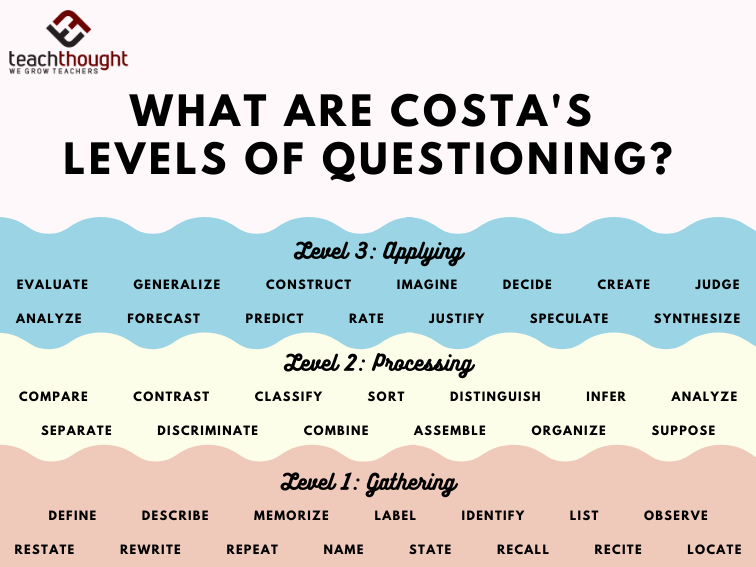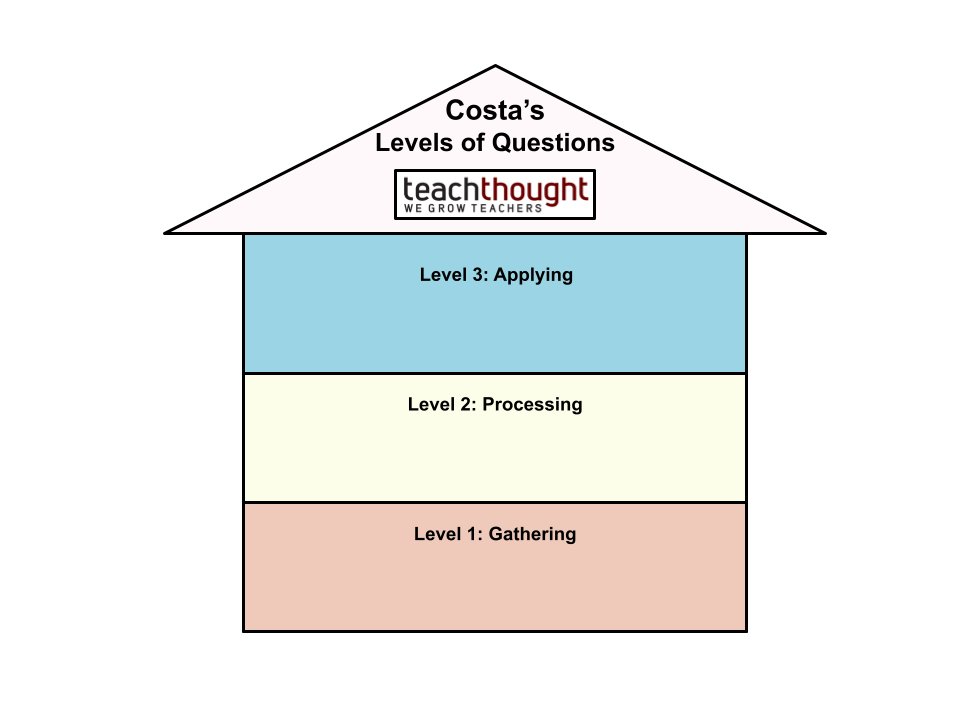

Costa’s Degrees of Questioning– designed by educational scientist Art Costa– feature three tiers of questioning developed to promote higher-level reasoning and query.
Comparable to Bloom’s taxonomy , Costa’s lower level triggers trainees to use more fundamental faculties; as pupils go up in degrees, the inquiries motivate them to make use of even more intricate reasoning abilities. Through decades of research on human durability, Dr. Costa also determined the 16 Practices of Mind , a set of actions that sustain trainees in navigating the difficulties that usually happen in college and life, in general. Several of Dr. Costa’s 16 behaviors– believing interdependently, innovating, collecting data, and using previous understanding to new scenarios– both require and strengthen higher degrees of doubting.
There is a substantive quantity of research that supports Dr. Costa’s schema. Newmann (1993 located that higher-order thinking compels trainees to “adjust info and concepts in manner ins which change their significance,” and “anticipates students to solve troubles and develop implying on their own,” which lines up with a constructivist view of education
Costa’s Levels of Questioning are typically illustrated using the metaphor of a home with 3 floorings:


Degree 1: Gathering
Level 1 questions primarily call for students to collaborate with info ‘on the web page.’ Solution to degree 1 questions are commonly literal; meaning, a pupil can actually indicate the response on a web page.
We’ve previously discussed Bloom’s Taxonomy power verbs , so you can forecast that Costa’s degrees have their very own collection of power verbs, as well. Here are a couple of that you may locate at the beginning of Degree 1 concerns:
- Specify
- Explain
- Remember
- Label
- Determine
- Listing
- Observe
- Restate
- Rewrite
- Repeat
- Name
- State
- Recall
- State
- Locate
- Select
- Suit
- Show
Degree 1 questions by content location could look like these examples:
- Science : Label the components of an animal cell.
- Math : Recite the formula for locating the volume of a cyndrical tube.
- Social Studies : Suit the name of the monarch to their respective country.
- English Language Arts : Situate the area in the story where the climax occurs.
You can see how the majority of these Degree 1 power verbs call for trainees to recall details, which is a crucial ability in its very own right. However, educators need to pursue most of their inquiries to drop in Degree 2 or 3, which test students to use higher-order thinking abilities.
Degree 2: Handling
Degree 2 questions go an action better than Level 1, motivating students to process information by ‘reading in between the lines.’ While students might need to make use of actual information to create their actions, Level 2 needs them to refine that information with what they currently know in order to make brand-new connections.
Here are some instances of Degree 2 power verbs:
- Contrast
- Contrast
- Categorize
- Type
- Distinguish
- Infer
- Assess
- Different
- Discriminate
- Integrate
- Assemble
- Organize
- Intend
Level 2 inquiries by content location could turn up in the complying with ways:
- Science : Compare the procedures of mitosis and meiosis.
- Mathematics : Categorize the geometric shapes according to their number of sides and angles.
- History : Assemble the complying with historical events in the order of importance, from a lot of to the very least.
- English Language Arts : Analy ze the effect that the author’s tone has on the general significance of the text.
Can you see how Degree 2 questions go an action additionally than Degree 1 More than simply spitting up information, learners take it and ‘do something’ with it. They classify, make distinctions, and compare/contrast it against an additional component to see how it impacts the whole. These type of skills can stimulate interest and construct a bridge to the concerns that really produce creative thinking and higher-level thinking.
Level 3: Applying
While Degree 1 inquiries trigger students to work with input, and Degree 2 questions challenge them to process that input in order to make brand-new connections. Right here, students take part in the highest-level reasoning skills to create an outcome. This could result from making examinations and analyses, testing options to various troubles, or making forecasts.
We have actually consisted of some instances of Degree 3 power verbs below:
- Examine
- Generalise
- Create
- Picture
- Decide
- Develop
- Court
- Evaluate
- Projection
- If/then
- Predict
- Rate
- Justify
- Speculate
- Synthesize
- Construct
- Assume
Level 3 questions by material area might resemble the following:
- Scientific research : Based upon information from the last decade of cyclone task in the southeast united state, forecast how the regularity of hurricane task will change in the next ten years.
- Math : Rate the possibility of a presidential prospect winning the political election based on securing the electoral ballots from the adhering to united state states: Florida, The Golden State, Virginia, New York, Illinois.
- Social Studies : Create a social compact that thinks about the effects of globalization and technical advancement in the 21 st century.
- English Language Arts : Build an argument that protects or refutes necessary staff member inoculation policies in the United States.
Whether preparing for discussion-based tasks, project-based understanding, or independent questions, instructors ought to aim to orient the majority of pupil thinking and interaction at Degrees 2 and 3 Analyses that trigger pupils to recall standard facts (such as the day of a historic occasion, or the name of a writer, or the formula for an equation) don’t actually assess trainees’ capacity to use brand-new skills or details to new contexts. A Level 2 or 3 inquiry would test trainees to make links with basic info. For example, as opposed to remembering a plain date, a more open-ended inquiry would certainly ask students to forecast, based on the moment in background that a certain event occurred, the probability of it recurring, provided a comparable sociopolitical atmosphere. Along the same lines, instead of recalling the names of popular writers, an educator might challenge trainees to make an argument for how an author would write about a certain modern problem.
In “A Talk with Teachers,” James Baldwin described the paradox of education: “As one begins to come to be aware, one begins to analyze the culture in which [they] are informed.” Degree 2 (and generally, degree 3 inquiries aim to cultivate this type of reaction in trainees, to trigger them to tilt their heads, do double-takes, explain disparities, disrupt the status, identify defects in existing organizations, and develop cutting-edge remedies for those flaws. These are the inquiries that motivate us to find up with more concerns, to think of our thinking, and to progress– both as individuals and cultures.